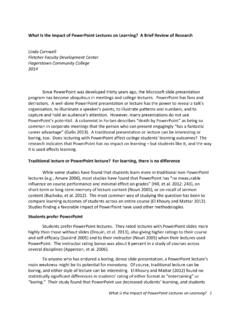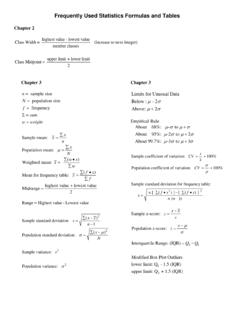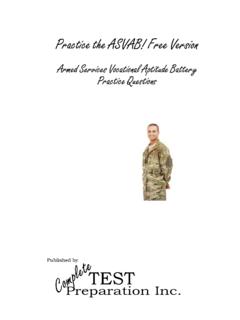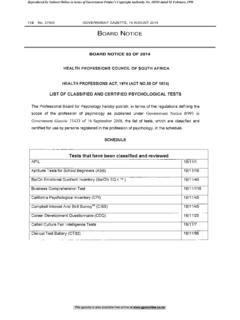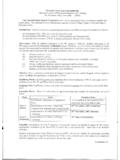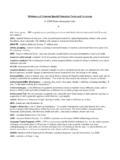Transcription of Managing Test Anxiety: Ideas for Students
1 Managing Test anxiety : Ideas for Students Jim Wright ( ) 1 Managing Test anxiety : Ideas for Students tests and quizzes are more widely used in schools than ever. Teachers rely on written examinations to show whether Students have learned the information presented in the course. Colleges and universities evaluate applicants performance on entrance examinations such as the Scholastic Aptitude Test (SAT) to judge whether these applicants are likely to be successful in their programs. With so much depending on test results, it is no wonder that Students often become anxious about taking tests . But don t worry! You can master test- anxiety and improve your performance on exams by following a simple plan: develop good study habits, use effective techniques to memorize content, take steps to reduce test anxiety , and take advantage of smart strategies when taking the test.
2 Read through the tips below for Ideas that you can use: Effective Study Habits It is not enough just to schedule lots of study time. You also need to make sure that you use effective study techniques. Some smart study tips are to: Create a quiet, neat study area. Distractions and clutter interfere with studying. Select a quiet spot where you are unlikely to be interrupted and organize it so that you can study efficiently. If space is cramped at home, use a corner of the local library or other suitable spot as your study haven. Study from good notes. Your study sessions will be productive only if you are studying from a legible and complete set of notes. If your notes are incomplete, see if your teacher has a loaner set of master class notes that you can review to get the missing information. Or ask a classmate who takes thorough notes if you can borrow them.
3 Use bits of unexpected free time to study. Carry pocket work with you to review whenever you have a few minutes of free time. For example, have a set of index cards with course notes on hand that you can conveniently pull out and look at during spare moments. Make a study schedule to avoid time-drains . People often don t realize how much time they spend on activities such as watching TV, surfing the Internet, talking with friends on the phone, and so on. If we aren t careful, though, we may discover that our leisure activities drain away time that could have been better used for study. Create a general study schedule, with time set aside for fun activities. Then be sure to limit those fun activities to the time allotted. Take advantage of your peak energy levels. Pick the time of day when you tend to have the most energy and try to schedule your study sessions at this time.
4 Also, study your most difficult or challenging material first, while you are still fresh. When you study at the same time each day, you will also find that studying begins to turn into a habit! Create a study group. Gather together classmates to form a study group. Groups can make studying more fun. Another advantage of groups is that its members can consult multiple sets of notes whenever a course concept is unclear. (Just be sure that your group takes studying seriously and Managing Test anxiety : Ideas for Students Jim Wright ( ) 2 doesn t spend too much time socializing!) Teach content as a learning check . A very effective way to check whether you have learned course content is to try to teach that information to another person ( , to a study partner).
5 The challenge of having to put key concepts into your own words and make them understandable to others will quickly reveal whether you have truly mastered that information. Recite information aloud. One study trick is to recite important information aloud. As you say the information, you also hear yourself saying it. These two channels for language, speaking and hearing, help to embed the information in your memory. Pose difficult questions. When studying, stop every so often and ask yourself, What question(s) or problem type(s) am I most afraid will be on the test? Your answer will give you a valuable hint about what parts of the course content you still find difficult and should spend the most time studying. Don t forget to review previously learned material. As you study, you start to learn the material.
6 But a single pass through your notes is usually not enough to cement learning. During each study period, set aside time ( , at the start of the session) to review previously learned information or concepts. Remember, review, review, review! Avoid cram sessions. Pulling all-night study sessions only tires you out and leaves you exhausted on the day of the test. (And people seldom think clearly when they are ) Rather than cramming your review into one or two marathon sessions, break your study up into short periods and study more frequently. Also, start studying early in the course, well before the first test, to give yourself a head start in learning the material. Reward yourself. Select an activity that you find rewarding ( , watching a favorite videotape, going for a walk, calling a friend). Set a contract with yourself to complete a set amount of studying ( , to study chemistry for 90 minutes).
7 If you have met your short-term study goal at the end of the study period, give yourself the reward. Tips to Memorize Content The best way to remember information from your notes or reading is to set aside enough time to study it well. Some tips for memorizing information are to: Read and review using SQ3R. The SQ3R approach is a structured, thorough method for learning the content of a book chapter or section: (1) Survey the chapter, to get an overview of what it contains. Read through the chapter summary and all headings. Also, briefly take note of figures, tables, and illustrations. (2) Create Questions based on each of the chapter headings. The questions should be similar to those that you might find on a test. (3) Read through the chapter. As you read, do your best to answer the questions that you developed.
8 (4) Recite the questions. From memory, verbally answer each question. (Hint: You can learn even more effectively if you write down your answers. Your responses can be written as single words or short phrases so long as they capture the main content of the answer.) (5) Review your answers. Compare your responses to the information in the text to make sure that your answers are complete and accurate. Managing Test anxiety : Ideas for Students Jim Wright ( ) 3 Make up flashcards. To memorize vocabulary, write the key word or term on one side of an index card and the definition on the other side. To review, read off the word and recite the definition from memory before flipping the card over and checking your answer. Then review the cards again, this time reading the definitions and recalling the key word or term from memory.
9 To memorize other information, copy a fact or concept on one side of the card and a test question matching the concept on the card s flip side. To review, read off each question and attempt to recall the answer before flipping the card over to check your work. Create acronyms or acrostics. When you want to remember words or concepts in sequence, you can sometimes combine the first letters of the words into an acronym. For example, the color spectrum of visible light is: Red-Orange-Yellow-Green-Blue-Indigo-Viol et. Generations of Students have memorized this sequence as the acronym (and fanciful name) ROY G. BIV. An acrostic is a sentence made up of words whose initial letters are memory cues. For example, biology classifies living organisms according to their place in the following categories: Kingdom-Phylum-Class-Order-Family-Genus- Species.
10 Many Students have memorized this sequence using the sentence, King Phillip Came Over From Germany Swimming. Use visualization tricks. Because we often think in pictures, we can use our mind s eye to help to memorize information as mental images. (Hint: Silly images can often make the information even easier to recall!) Here are a couple of Ideas for memorizing a list of words or key terms: 1. Chaining. First, think of an object to represent each word or term that you must commit to memory. Then construct a mental chain that connects the objects in a short sequence. If, for example, you wanted to memorize the first four planets (Mercury, Venus, Earth, Mars), you might visualize a winged god (Mercury) planting a Venus flytrap in a pile of earth and surrounding it with Mars bars. 2. Familiar places. Select a location that is quite familiar to you ( , your house or apartment).

